Two Different Statements from Civil Rights Leaders Call for Discontinuation of Unsecure, Unverifiable, Disenfranchising DRE/Touch-Screen Voting Technology
Both Destroy Myth of Need to Sacrifice Verifed Ballots for Accessibility...
Hallelujah!
Voters with disabilities are finally beginning to speak out against the use of Direct Recording Electronic (DRE, often known as "touch-screen") voting systems!
After years of DRE supporters, and indeed the Help America Vote Act (HAVA) of 2002, using the canard that blind and disabled voters must use DREs to vote privately and independently, a number of leaders in the disabilities community are speaking out against their having been used as a wedge to force the nationwide implementation of such disenfranchising, dangerous voting systems.
Two different landmark statements on the issue have now been released, The BRAD BLOG has learned. One statement [PDF] released last week by the Disability Law Center and the ACLU speaks in support of the decision by the Massachusetts Secretary of State to approve the use of ballot marking devices, as opposed to DREs, for use by the state's disabled voters.
The second, released today to The BRAD BLOG in advance of Congressional subcommittee hearings tomorrow, is signed so far by more than 20 leaders of the blind and disabled communities and calls for "an immediate ban" on DRE voting systems. Like the release from the Disability Law Center, the newly released statement crushes the long-overused myth that such unsecure, disenfranchising, failed technology is required for disabled access to private, independent voting. (The complete statement is posted at the end of this item.)
"Providing secure voting machines for voters with disabilities is part and parcel of protecting [disabilities voters'] rights to equal access to the ballot and to having their votes reliably counted," said Stanley J. Eicher, Executive Director of the Disability Law Center in their March 5th statement.
"The decision by the Secretary shows that it is both possible and essential to build common ground between the disability rights community and the growing number of citizens who are concerned that many of the proposed new technologies are subject to tampering and error," said Eichner, adding notably, "We must debunk the myth that we have to choose between accessible voting and verifiable voting. Democracy requires that we have both."
The brief but no-uncertain-terms statement today from the disabilities advocates calls for a nationwide ban on the use of DRE technology.
"Electronic ballot systems such as the direct record electronic (DRE) machines...now in use," the statement reads, "have quickly proven to be neither fully accessible to all voters nor secure and accurate methods of recording, tallying, and reporting votes. While the goal of private voting has been achieved by some voters, this has often been without meaningful assurance that our votes have been counted as cast."
The disabilities leaders go on to point out that verification of ballots and the accuracy of their tabulation need not be sacrificed for accessibility or privacy. A similar point was at the heart of a report recently released by one of the letter's authors, blind technology expert Noel H. Runyan. His report, published simultaneously by both Demos and VoterAction.org, concerns the failure of DRE systems to meet both HAVA requirements and the accessibility and verification needs of disabled voters.
The statement further describes DRE electronic balloting systems as "inappropriate for use" and calls on "all disability rights groups, other civil rights groups, election protection groups, and elected officials to recognize the necessity for an immediate ban" on such dangerous, unreliable, and unsecure technology:
This new and most welcome statement from this particular community is in stark contrast to the only other major voices previously allowed to testify before Congress on such matters, such as the National Federal for the Blind (NFB) and Jim Dickson of the American Association of People with Disabilities (AAPD).
Despite both of those groups having received large donations from voting machine companies such as Diebold, Inc., both have been granted extraordinary access to Congress and have leveraged that access to call for the use of DRE systems for their communities (and even paperless ones at that).
The NFB received $1 million from Diebold, and Jim Dickson's group, although he lied to The BRAD BLOG about it previously, received at least $16,000 from the voting machine vendors, according to the New York Times.
We are happy to see new, uncompromised voices from this important community finally speaking up and adding their concerns to others such as Johns Hopkins computer scientist Avi Rubin, who testified last week that DRE systems, with or without a so-called "voter verified paper audit trail," are "not a reasonable voting system."
It would be nice if Runyan and some of the other signatories were invited to testify before Congress as well, and equally nice if Congress held hearings devoted to the issue of the safety, accuracy and accessibility of DRE systems before moving forward on Election Reform bills such as Rep. Rush Holt's HR811, which unfortunately falls short of banning DRE technology in American democracy.
NOTE: We will be Guest Hosting Cynthia Black's Action Point this Sunday 3/18/07 @ 3pm ET (12noon PT) on Phoenix's Air America/NovaM affiliate 1480 KPHX. We hope to have Runyan as one of our featured guests.
UPDATE: Here is my interview on on Action Point with Noel Runyan. MP3 appx. 30 minutes
The complete statement from the disabilities leaders, including Runyan and many others, follow in full below...
--- Click here for REST OF STORY!... ---

 In the second panel in the House Oversight Committee hearings this morning, following the testimony of Valerie Plame-Wilson, the Director of the White House Security Office, James Knodell, has stunned the Congress members by disclosing that no investigation into the leaking of Plame-Wilson's covert identity as a CIA operative was ever conducted by his office!
In the second panel in the House Oversight Committee hearings this morning, following the testimony of Valerie Plame-Wilson, the Director of the White House Security Office, James Knodell, has stunned the Congress members by disclosing that no investigation into the leaking of Plame-Wilson's covert identity as a CIA operative was ever conducted by his office!

 'Green News Report' 10/31/24
'Green News Report' 10/31/24
 'Closing Arguments'
'Closing Arguments' Trump Promises to be a Lawless, Authoritarian President. Believe Him: 'BradCast' 10/29/24
Trump Promises to be a Lawless, Authoritarian President. Believe Him: 'BradCast' 10/29/24 'Green News Report' 10/29/24
'Green News Report' 10/29/24 Election Heats Up: Ballots Burn, Billionaires 'Obey in Advance', Callers Ring In: 'BradCast' 10/28/24
Election Heats Up: Ballots Burn, Billionaires 'Obey in Advance', Callers Ring In: 'BradCast' 10/28/24 Musk's Privatized Internet Satellite System Threatens U.S. National Security
Musk's Privatized Internet Satellite System Threatens U.S. National Security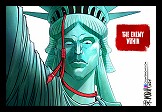 Sunday 'VOTE NOW!' Toons
Sunday 'VOTE NOW!' Toons Harris on Hope, Trump's Fasc-ism in Bumpy Closing Days: 'BradCast' 10/24/24
Harris on Hope, Trump's Fasc-ism in Bumpy Closing Days: 'BradCast' 10/24/24 'Green News Report' 10/24/24
'Green News Report' 10/24/24 Kelly on Trump: 'Fascist', Admires Hitler, Disrespects Constitution and Disabled Vets: 'BradCast' 10/23/24
Kelly on Trump: 'Fascist', Admires Hitler, Disrespects Constitution and Disabled Vets: 'BradCast' 10/23/24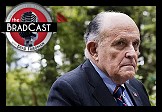 Accountability Comes For Rudy, Other Election Deniers: 'BradCast' 10/22/24
Accountability Comes For Rudy, Other Election Deniers: 'BradCast' 10/22/24 'Green News Report' 10/22/24
'Green News Report' 10/22/24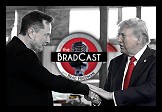 Elon Musk's 'Vote Buying' and Lying for Trump: 'BradCast' 10/21/24
Elon Musk's 'Vote Buying' and Lying for Trump: 'BradCast' 10/21/24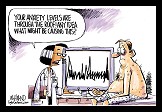 Sunday 'High Anxiety' Toons
Sunday 'High Anxiety' Toons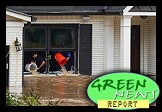 'Green News Report' 10/17/24
'Green News Report' 10/17/24 Fake v. Real Censorship and Trump/Fox Fetish-ized Grievance World: 'BradCast' 10/17/24
Fake v. Real Censorship and Trump/Fox Fetish-ized Grievance World: 'BradCast' 10/17/24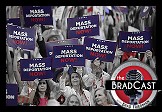 'Americans Aren't Prepared for Trump's Police State': 'BradCast' 10/16/24
'Americans Aren't Prepared for Trump's Police State': 'BradCast' 10/16/24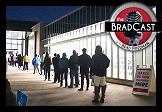 Good News for Georgia Voters, the Economy and Kamala Harris: 'BradCast' 10/15/24
Good News for Georgia Voters, the Economy and Kamala Harris: 'BradCast' 10/15/24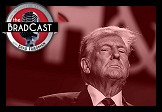 Fascism Comes to America: 'BradCast' 10/14/24
Fascism Comes to America: 'BradCast' 10/14/24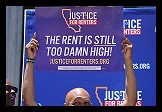 Institutional Landlords Flood CA Voters With Deceptive Ads on Props 33 and 34
Institutional Landlords Flood CA Voters With Deceptive Ads on Props 33 and 34 Milton's Mess, FL's U.S. House Liars, Trump's Made-in-China Bibles: 'BradCast' 10/10/24
Milton's Mess, FL's U.S. House Liars, Trump's Made-in-China Bibles: 'BradCast' 10/10/24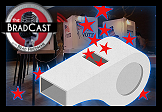 Whistleblower Org Readies to Support Election Officials: 'BradCast' 10/9/24
Whistleblower Org Readies to Support Election Officials: 'BradCast' 10/9/24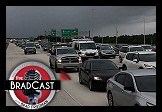 Florida Braces for 'Devastating to Catastrophic' Milton: 'BradCast' 10/8/24
Florida Braces for 'Devastating to Catastrophic' Milton: 'BradCast' 10/8/24
 VA GOP VOTER REG FRAUDSTER OFF HOOK
VA GOP VOTER REG FRAUDSTER OFF HOOK Criminal GOP Voter Registration Fraud Probe Expanding in VA
Criminal GOP Voter Registration Fraud Probe Expanding in VA DOJ PROBE SOUGHT AFTER VA ARREST
DOJ PROBE SOUGHT AFTER VA ARREST Arrest in VA: GOP Voter Reg Scandal Widens
Arrest in VA: GOP Voter Reg Scandal Widens ALL TOGETHER: ROVE, SPROUL, KOCHS, RNC
ALL TOGETHER: ROVE, SPROUL, KOCHS, RNC LATimes: RNC's 'Fired' Sproul Working for Repubs in 'as Many as 30 States'
LATimes: RNC's 'Fired' Sproul Working for Repubs in 'as Many as 30 States' 'Fired' Sproul Group 'Cloned', Still Working for Republicans in At Least 10 States
'Fired' Sproul Group 'Cloned', Still Working for Republicans in At Least 10 States FINALLY: FOX ON GOP REG FRAUD SCANDAL
FINALLY: FOX ON GOP REG FRAUD SCANDAL COLORADO FOLLOWS FLORIDA WITH GOP CRIMINAL INVESTIGATION
COLORADO FOLLOWS FLORIDA WITH GOP CRIMINAL INVESTIGATION CRIMINAL PROBE LAUNCHED INTO GOP VOTER REGISTRATION FRAUD SCANDAL IN FL
CRIMINAL PROBE LAUNCHED INTO GOP VOTER REGISTRATION FRAUD SCANDAL IN FL Brad Breaks PA Photo ID & GOP Registration Fraud Scandal News on Hartmann TV
Brad Breaks PA Photo ID & GOP Registration Fraud Scandal News on Hartmann TV  CAUGHT ON TAPE: COORDINATED NATIONWIDE GOP VOTER REG SCAM
CAUGHT ON TAPE: COORDINATED NATIONWIDE GOP VOTER REG SCAM CRIMINAL ELECTION FRAUD COMPLAINT FILED AGAINST GOP 'FRAUD' FIRM
CRIMINAL ELECTION FRAUD COMPLAINT FILED AGAINST GOP 'FRAUD' FIRM RICK SCOTT GETS ROLLED IN GOP REGISTRATION FRAUD SCANDAL
RICK SCOTT GETS ROLLED IN GOP REGISTRATION FRAUD SCANDAL VIDEO: Brad Breaks GOP Reg Fraud Scandal on Hartmann TV
VIDEO: Brad Breaks GOP Reg Fraud Scandal on Hartmann TV RNC FIRES NATIONAL VOTER REGISTRATION FIRM FOR FRAUD
RNC FIRES NATIONAL VOTER REGISTRATION FIRM FOR FRAUD EXCLUSIVE: Intvw w/ FL Official Who First Discovered GOP Reg Fraud
EXCLUSIVE: Intvw w/ FL Official Who First Discovered GOP Reg Fraud GOP REGISTRATION FRAUD FOUND IN FL
GOP REGISTRATION FRAUD FOUND IN FL




















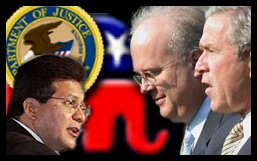 As you might expect, there is much more to the "voter fraud" angle in the U.S. Attorneys Purge scandal than initially meets the eye. As you might also expect, we've taken keen notice as we've long been following and reporting on the insidious machinations behind the GOP/White House/Rove scheme to (rather successfully) invent the cynical notion of a "voter fraud" epidemic in America for purely political purposes.
As you might expect, there is much more to the "voter fraud" angle in the U.S. Attorneys Purge scandal than initially meets the eye. As you might also expect, we've taken keen notice as we've long been following and reporting on the insidious machinations behind the GOP/White House/Rove scheme to (rather successfully) invent the cynical notion of a "voter fraud" epidemic in America for purely political purposes. Ann Coulter exceeded expectations at this year’s Conservative Political Action Conference
Ann Coulter exceeded expectations at this year’s Conservative Political Action Conference 
 Last week, more than thirty 'good government' groups including the ACLU, POGO, CREW, Liberty Coalition, and September 11th Advocates
Last week, more than thirty 'good government' groups including the ACLU, POGO, CREW, Liberty Coalition, and September 11th Advocates 
 The good Catherine Crier of Court TV's
The good Catherine Crier of Court TV's 













